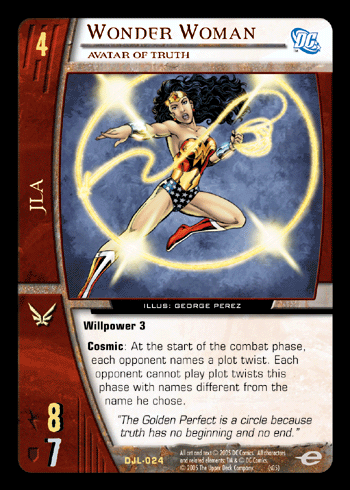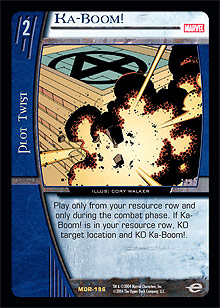
Vs. System is a game of both complete and incomplete information. In one sense, the information is complete—if you’re playing Constructed, you usually have a pretty good idea of what your opponent has in his or her deck and at what stages of the game the opponent can play those cards. For example, if you’re playing against Curve Sentinels, you can assume that your opponent has some ATK pumps, maybe some
Acrobatic Dodges, perhaps some
Finishing Moves, and so on. Of course, not every deck is as well-known as Curve Sentinels, but even against a less prevalent team, you can generally make good assumptions about what they can and would like to do. Even in Sealed Pack, where the individual cards in each deck vary tremendously, anyone experienced in a format can at least make reasonable assumptions about the types of cards that his or her opponent has access to, if not know the specific cards themselves.
While an experienced player usually has complete (or close to complete) information in one sense, in another sense Vs. System is a game of very incomplete information. Your opponent usually has a bunch of face-down resources and a number of cards in hand. While you can generally narrow down the types of effects your opponent has access to, the exact cards are a completely different matter. This lack of information often results in players making plays that they would never make if they could see their opponents' hands and resource rows, and it happens all the time.
For example, let’s say it’s the third turn of the game. Your opponent has the odd initiative and has recruited a 5 ATK/5 DEF character to go along with his 3 ATK/2 DEF 2-drop. (Just assume, for simplicity’s sake, that these characters have no other text.) You’ve recruited your first drop of the game, a 5 ATK/4 DEF character. Your opponent attacks his 3-drop into yours. Now, you’ve got an Acrobatic Dodge down, and you know your opponent has Finishing Move in his deck. Regardless of whether your opponent has the Finishing Move or not, he is always going to make this attack. The two characters stun each other and then your opponent gets to swing in with his 2-drop. What makes this a tricky situation for you is the threat of Finishing Move from your opponent and how that relates to your use of the Dodge. If your opponent has the Move, it’s in your best interest to use the Dodge, as it could potentially prevent your opponent from KO’ing your only drop. However, if your opponent doesn’t have the Finishing Move, using the Dodge isn’t optimal, since all you’d do is save some endurance loss at the cost of a great defensive plot twist. Obviously, even in an example this simple, there are other considerations to factor in, but the point is that the lack of knowledge of an opponent’s options hinders a player’s ability to play optimally.

A new card from the JLA set, Wonder Woman, Avatar of Truth, changes this common dynamic dramatically. For starters, she’s an 8 ATK/7 DEF 4-drop with flight, which makes her above the norm as far as stats go. She also has willpower 3, which can often be a pretty significant boost, as the previous DC Modern Age format demonstrated. Those enticing aspects aside, what makes this card interesting and powerful is her ability to restrict a player only to one specific plot twist during the combat phase. The positive effects of this card are twofold. The obvious benefit is that your opponent can only play one type of plot twist. If your opponent was relying on multiple plot twists to achieve a goal (for example, using a Savage Beatdown to stun your largest drop, then using a Finishing Move to KO it), that play would no longer work. If your opponent was planning to use a rarely seen plot twist to surprise you during combat, the cat’s out of the bag. If your opponent has access to multiple different combat pumps (for instance, the GLEE decks at PC Indy had a variety of defensive pumps, offensive pumps, and KO effects), his or her options are cut off dramatically, and your opponent will often have to guess which effect grants more utility based on (here we go again) incomplete information.
While the negative effects Wonder Woman has on your opponent are fairly obvious, the benefits Wonder Woman gives you as the controller are slightly more subtle (though possibly more devastating). Rewind back to the first example I gave at the start of the article, except put Wonder Woman in place of your drop with no text. If, at the start of combat, your opponent names Finishing Move, your play with Acrobatic Dodge is now great. Not only do you know your opponent’s intent (to use a Finishing Move on your character), but you can also safely use your Dodge without fear of your opponent using a combat pump to stun your character anyway. If your opponent names Savage Beatdown, you can just suck up the damage, knowing that your Wonder Woman is safe from a KO effect. And with a sprinkle of effects in the JLA team that allow characters to regain cosmic counters, Wonder Woman’s utility can wreak havoc on your opponent for multiple turns in a row, cutting off opposing options while providing you with tremendous information.
 An interesting aspect of Wonder Woman from the opposing side of the fence is that it can allow a player to bluff plot twists that he or she doesn’t even have. While such a situation may appear infrequently, it does create an interesting opportunity that no other card in Vs. System can really imitate. For example, in one test game involving this card, Brian Kibler controlled Wonder Woman, and I knew there was a location in his deck that I couldn’t afford to have him flip during combat that turn. I didn’t actually have a relevant plot twist for combat, so I named Ka-Boom! While this example is pretty extreme, the types of plays and mental maneuvering this card can generate are unique in Vs. System.
An interesting aspect of Wonder Woman from the opposing side of the fence is that it can allow a player to bluff plot twists that he or she doesn’t even have. While such a situation may appear infrequently, it does create an interesting opportunity that no other card in Vs. System can really imitate. For example, in one test game involving this card, Brian Kibler controlled Wonder Woman, and I knew there was a location in his deck that I couldn’t afford to have him flip during combat that turn. I didn’t actually have a relevant plot twist for combat, so I named Ka-Boom! While this example is pretty extreme, the types of plays and mental maneuvering this card can generate are unique in Vs. System.
I expect Wonder Woman to impact Constructed significantly. With her better-than-average stats, flight, willpower, cosmic, and a tremendous ability, she has the skill set to find a home in a variety of decks. While her power might not jump out as the strongest ability ever to grace a Vs. System character, the restrictions it puts on your opponent and the information it provides you give Wonder Woman the potential to make a big splash in both Constructed and Sealed Pack.
Tomorrow's Preview: